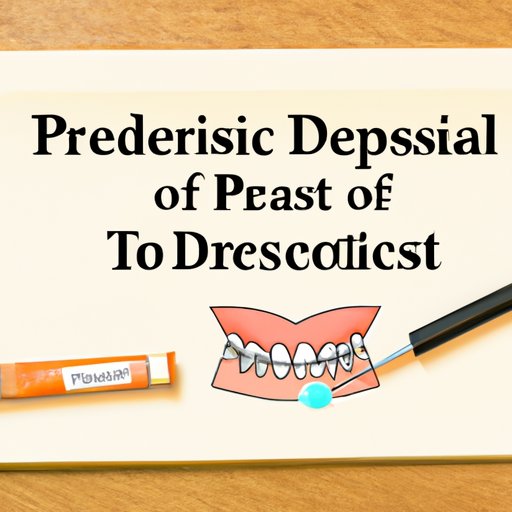
Introduction
Periodontal disease is a common, but serious infection of the gums, affecting millions of people worldwide. It’s essential to seek professional treatment as early as possible to prevent further damage to your oral health. In this article, we will guide you through the best practices to treat periodontal disease, including prevention techniques, treatment options, natural remedies, and its links to systemic health.
Prevention
Prevention is the key to maintain a healthy mouth. Therefore, it is important to follow proper oral hygiene practices, a healthy diet, and lifestyle changes. Brushing your teeth twice a day with fluoride toothpaste and flossing at least once a day are the most effective ways to prevent gum disease. Also, consuming nutritious food rich in vitamins and minerals can boost your immune system, promoting healthier gums. Smoking also doubles the risk of gum disease; therefore, quitting smoking is essential to prevent gum disease.
Regular dental checkups and cleanings can help detect any early signs of gum disease. Your dentist will advise on how often you should visit, depending on the condition of your oral health. Scaling and polishing, which involve the removal of plaque and tartar buildup from the teeth and gum line, respectively, also helps keep gums healthy.
Symptoms
The symptoms of gum disease can vary from person to person. However, if you experience any of the following symptoms, you should consult your dentist immediately.
– Bleeding gums during brushing or flossing
– Swollen, tender, or red gums
– Receding gum line
– Persistent bad breath
– Loose teeth or changes in your bite
– Pus between teeth and gums
If periodontal disease is left untreated, it can lead to severe complications, such as tooth loss and bone damage, so it’s essential to seek professional treatment as early as possible.
Treatment Options
Non-surgical options, such as scaling and root planing, are the most common treatment options for periodontal disease. Scaling involves the removal of plaque buildup from below the gum line, while root planing helps to smooth out rough patches on the tooth root, reducing the build-up of bacteria. This treatment can prevent further damage to the gum line and bone that supports the teeth.
In severe cases, surgical treatment, such as pocket reduction surgery and bone grafts, are necessary to treat periodontal disease effectively. Pocket reduction surgery involves the removal of tartar buildup in the gum pockets, allowing the gums to reattach to the teeth. Bone grafts, on the other hand, are used to replace damaged bone tissue with either natural or synthetic bone.
While both surgical and non-surgical options can provide relief from gum disease, they have their pros and cons. Your dentist will recommend the most suitable treatment option, depending on the severity of the gum disease and your overall health condition.
Natural Remedies
In addition to traditional treatment options, many natural remedies also claim to provide relief from gum disease. Essential oils such as peppermint, clove, and tea tree oil have anti-inflammatory properties that can help to reduce redness and swelling of the gums. Other holistic approaches such as oil pulling, turmeric paste, and hydrogen peroxide rinse can also be used to improve oral health.
However, it’s important to note that these remedies may not be scientifically proven. Also, some essential oils can cause irritation to the mouth or even be toxic if ingested in large amounts. Therefore, it’s always best to consult with your dentist before using any natural remedies.
The Link Between Periodontal Disease and Systemic Health
There is compelling evidence that suggests an association between periodontal disease and overall health. Gum disease has been linked to several other health conditions such as heart disease, dementia, and diabetes. Inflammation caused by gum disease can also worsen existing conditions such as arthritis, respiratory diseases, and pregnancy complications. Therefore, maintaining good oral health through regular dental checkups and proper oral hygiene practices is essential to reduce the risk of other systemic diseases.
Emotional Impact
Periodontal disease can also have a significant emotional impact on affected individuals. Some of the psychological symptoms that may arise from gum disease include anxiety, depression, and loss of self-esteem. Coping strategies such as mindfulness, meditation, and seeking emotional support from friends and family can help alleviate the emotional stress caused by gum disease.
Periodontal Disease in Children
Children can also develop gum disease if proper oral hygiene is not maintained. The symptoms of periodontal disease in children include gum swelling, redness, and bleeding during brushing. Treatment options for children include scaling, cleaning, and the application of fluoride varnish. To prevent gum disease in children, encourage them to brush their teeth twice a day and maintain a healthy diet rich in fruits and vegetables.
Conclusion
In conclusion, treating periodontal disease is essential to maintain good oral health and overall well-being. Following proper oral hygiene practices, regular dental checkups, and cleanings, quitting smoking, and consuming a healthy diet can prevent the onset of gum disease. If you experience any of the symptoms of gum disease, seeking professional treatment as early as possible is crucial. Remember, maintaining good oral hygiene can benefit both oral and overall health.




